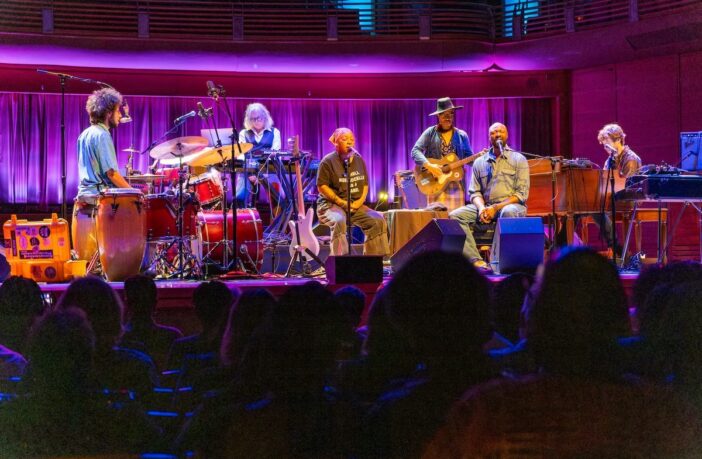Spoken word and prophetic music collided in a transformative experience on Saturday as Grammy-winning artist Meshell Ndegeocello debuted a live performance of her newest album, “No More Water: The Gospel of James Baldwin,” concluding the Strathmore’s two-month celebratory series for Baldwin’s centenary. Like the album, the performance embodied the spirit of 20th century forward-thinkers and reflected their footprint on societal reform that remains prevalent today.
“African American music has always been about [the]struggle, but it’s also been about so much more that we don’t want to be defined just by that,” said Dr. Dwandalyn R. Reece, associate director for the Humanities at the Smithsonian’s National Museum of African American History and Culture (NMAAHC). “It shouldn’t reflect just one view of our life, it should reflect joy and creativity and innovation. And I think what’s interesting about this particular [album]is that it’s doing both.”
Inspired by Baldwin’s 1963 novel “The Fire Next Time,” the unique rendition – which was released on his 100th birthday, Aug. 2 – serves as a striking homage to the eminent writer and activist, paralleling many of the notable themes of his work such as race, gender, sexuality, religion and more.
Similarly, Ndegeocello’s performance at The Music Center at Strathmore was a testament to the power of intergenerational collaboration. The acoustics of a live band in a colorfully-lit rotunda transported audiences to a dimension where identity, empowerment and introspection were explored, and the revolution of creativity in social justice remained unchanged.
Each song was prefaced with a provocative quote or excerpt, while a collection of voices empowered by the words and movement of visionaries like Baldwin and Audrey Lorde sang testimonies of love and demands of action in a politically estranged society.
In a pre-concert lecture, Timothy Burnside, a museum professional who has worked closely with Ndegeocello, said she considers the album a reflection of the artist’s connection to not only Baldwin and other trailblazers, but also herself.
“One of the really powerful things when you look at [Ndegeocello’s] catalog, it’s almost as though everything was leading her to this point with this album,” said Burnside. “Thinking about [her integrity]in the spaces she’s been in…talking about her own identity and communities that she belongs to, but also, at times, about those narratives. And all the while, just ultimately, a beautiful musician who is insistent upon ideas of collaboration.”
She noted the “powerful connection” between Baldwin and Ndeogeocello as creators who exist without limitations to genre or restrictions to identity, and hone in on the influence that creativity can have on societal issues.
Reece, who coined Ndegeocello an “unclassifiable” artist, believes “No More Water” speaks volumes to the recurring themes of love and liberation that Baldwin challenged in his own writing, and incites a powerful dialogue that can evolve in history.
“What would Baldwin and Meshell be saying to each other? I think Baldwin would appreciate the conversation, but also want to be challenged,” Reece said. “We’re engaging in unite of these Black women putting themselves into the process, and I like to imagine that he would’ve invited that, he wanted that kind of thoughtful calibration. So it’s also an homage, but it’s continuing that conversation, and expanding it so that we can continue to engage with it.”


